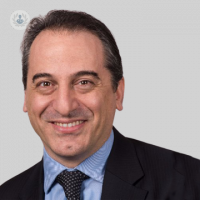What is a gastric sleeve?
Gastric sleeve (or sleeve gastrectomy) is a restrictive weight loss surgical procedure, where the capacity of the stomach is dramatically reduced by about 75% to aid in long-term weight loss.
The procedure is called gastric sleeve as the surgeon removes part of the stomach and joins the remainder together, which resembles a ‘sleeve’ and is the size of a banana.
A reduction in stomach size makes it difficult for a patient to overeat. The surgeon also removes the part of the stomach that produces the hunger hormone ghrelin, which is known to boost appetite.

Why is a gastric sleeve operation performed?
A gastric sleeve is an option for patients who are obese, with a body mass index (BMI) greater than 50 and who have not managed to lose the necessary weight through other methods such as a healthy diet and exercise.
What does it consist of?
Sleeve gastrectomy intervention is done by laparoscopy that usually lasts between 60 to 90 minutes. The surgeon will make a few small cuts, between 2 and 5 incisions, in the abdomen through which the laparoscope (an instrument with a tiny camera that sends pictures to a monitor) will be introduced.
This enables the surgeon to see the inside of the abdomen during the operation. Then the removal of most of the stomach will be carried out, leaving a vertical tube shape, which is an irreversible procedure.
How do I prepare for a gastric sleeve?
Before having a gastric sleeve operation the patient should undergo various tests, such as a complete physical examination, blood tests and an ultrasound of the gallbladder to confirm that they are healthy enough to have weight loss surgery. There are essential steps that a patient must take to prepare for bariatric surgery, including a lot of lifestyle changes.
It is recommended to quit smoking as the use of tobacco products have been proven to increase the risk of complications during and after surgery. Changes to diet, such as eating three regular meals a day with two small snacks per day, is a good way to prepare the body for the routine following surgery. Most doctors require a special pre-operation diet.
Patients are advised to drink more water and limit other beverages. They should incorporate physical activity into their everyday lives and start with a small exercise routine. A nutritionist and personal trainer would be able to advise the patients on how best implement these positive changes.
What is recovery like?
Normally, the patient can go home two days after the gastric sleeve and will have to take analgesics. There are four phases for a patient to follow post-operation to help transition to a solid food diet. They are:
- Phase 1 – which usually lasts for a week after surgery. Patients should only consume clear liquids and will find that they have no appetite.
- Phase 2 – around 10 days after surgery, most people will start to feel hungry again. At this stage, they start to incorporate foods that are of low nutritional value but adding in more protein. They should drink lots of water and drink protein powder that is sugar-free and mixed with clear liquid. Towards the end of this week, patients can add in Greek yoghurt, oatmeal, mashed potatoes, smoothies and scrambled eggs.
- Phase 3 – patients transition to soft foods including soft fish, eggs, vegetables and soups.
- Phase 4 – after four weeks it is time to transition to solids, sticking to three small meals a day and two snacks. All sugar, processed and low-fibre foods should be avoided.
Gastric sleeve
Professor Francesco Rubino - Surgery
Created on: 07-24-2015
Updated on: 06-28-2023
Edited by: Conor Dunworth
What is a gastric sleeve?
Gastric sleeve (or sleeve gastrectomy) is a restrictive weight loss surgical procedure, where the capacity of the stomach is dramatically reduced by about 75% to aid in long-term weight loss.
The procedure is called gastric sleeve as the surgeon removes part of the stomach and joins the remainder together, which resembles a ‘sleeve’ and is the size of a banana.
A reduction in stomach size makes it difficult for a patient to overeat. The surgeon also removes the part of the stomach that produces the hunger hormone ghrelin, which is known to boost appetite.

Why is a gastric sleeve operation performed?
A gastric sleeve is an option for patients who are obese, with a body mass index (BMI) greater than 50 and who have not managed to lose the necessary weight through other methods such as a healthy diet and exercise.
What does it consist of?
Sleeve gastrectomy intervention is done by laparoscopy that usually lasts between 60 to 90 minutes. The surgeon will make a few small cuts, between 2 and 5 incisions, in the abdomen through which the laparoscope (an instrument with a tiny camera that sends pictures to a monitor) will be introduced.
This enables the surgeon to see the inside of the abdomen during the operation. Then the removal of most of the stomach will be carried out, leaving a vertical tube shape, which is an irreversible procedure.
How do I prepare for a gastric sleeve?
Before having a gastric sleeve operation the patient should undergo various tests, such as a complete physical examination, blood tests and an ultrasound of the gallbladder to confirm that they are healthy enough to have weight loss surgery. There are essential steps that a patient must take to prepare for bariatric surgery, including a lot of lifestyle changes.
It is recommended to quit smoking as the use of tobacco products have been proven to increase the risk of complications during and after surgery. Changes to diet, such as eating three regular meals a day with two small snacks per day, is a good way to prepare the body for the routine following surgery. Most doctors require a special pre-operation diet.
Patients are advised to drink more water and limit other beverages. They should incorporate physical activity into their everyday lives and start with a small exercise routine. A nutritionist and personal trainer would be able to advise the patients on how best implement these positive changes.
What is recovery like?
Normally, the patient can go home two days after the gastric sleeve and will have to take analgesics. There are four phases for a patient to follow post-operation to help transition to a solid food diet. They are:
- Phase 1 – which usually lasts for a week after surgery. Patients should only consume clear liquids and will find that they have no appetite.
- Phase 2 – around 10 days after surgery, most people will start to feel hungry again. At this stage, they start to incorporate foods that are of low nutritional value but adding in more protein. They should drink lots of water and drink protein powder that is sugar-free and mixed with clear liquid. Towards the end of this week, patients can add in Greek yoghurt, oatmeal, mashed potatoes, smoothies and scrambled eggs.
- Phase 3 – patients transition to soft foods including soft fish, eggs, vegetables and soups.
- Phase 4 – after four weeks it is time to transition to solids, sticking to three small meals a day and two snacks. All sugar, processed and low-fibre foods should be avoided.


Which medical conditions can gastric sleeve surgery help to treat?
By Mr Sanjay Agrawal
2024-11-21
In this informative article, revered consultant surgeon Mr Sanjay Agrawal, who specialises in bariatric surgery, reveals to what extent gastric sleeve surgery can help with weight loss and the management of other conditions. See more


Visiting the weight loss clinic with Mr Sanjay Agrawal
By Mr Sanjay Agrawal
2024-11-20
Have you tried everything to lose weight but nothing seems to be working? The London Obesity Group provide weight loss surgery for suitable patients that have struggled to lose weight. Experienced bariatric surgeon Mr Sanjay Agrawal goes through the different weight loss surgeries on offer at the clinic. See more


An expert guide: Tummy tuck procedures for post-weight loss patients
By Mr Jonathan Duncan
2024-11-20
Revered consultant plastic and reconstructive surgeon Mr Jonathan Duncan gives an expert guide to abdominoplasty procedures for patients who have undergone significant weight loss in this informative article. See more


What is metabolic endoscopy?
By Dr Jude A. Oben
2024-11-19
Metabolic endoscopy is an innovate procedure in weight management that delves into the physiological processes that influence weight gain, retention, and loss. Here, Dr Jude Oben, renowned consultant hepatologist, offers his expert insight into metabolic endoscopy and its role in long-term weight management. See more
Experts in Gastric sleeve
-
Professor Francesco Rubino
SurgeryExpert in:
- Gastric sleeve
- Diabetes surgery
- Bariatric surgery
- Obesity
- Gastric bypass
- Gastric band
-
Mr Majid Hashemi
SurgeryExpert in:
- Gastric sleeve
- Achalasia
- Acid reflux
- Hiatal hernia
- Gastric bypass
- Obesity surgery
-
Mr Kesava Reddy Mannur
SurgeryExpert in:
- Gastric sleeve
- Gastric bypass
- Gastric band
- Duodenal switch
- Hernia
- Cholecystectomy
-
Mr Bart Decadt
SurgeryExpert in:
- Obesity surgery
- Gastric sleeve
- Gastric band
- Gastric bypass
- Acid reflux
- Gallbladder surgery
-
Dr Antanas Mickevicius
SurgeryExpert in:
- Gastric bypass
- Gastric sleeve
- Upper GI surgery
- Acid reflux
- Hiatal hernia
- Bariatric surgery problems
- See all

London Bridge Hospital - part of HCA Healthcare
London Bridge Hospital - part of HCA Healthcare
27 Tooley St
No existe teléfono en el centro.
By using the telephone number provided by TOP DOCTORS, you automatically agree to let us use your phone number for statistical and commercial purposes. For further information, read our Privacy Policy
Top Doctors

The Sloane Hospital - part of Circle Health Group
The Sloane Hospital - part of Circle Health Group
125 Albemarle Rd, Beckenham BR3 5HS
No existe teléfono en el centro.
By using the telephone number provided by TOP DOCTORS, you automatically agree to let us use your phone number for statistical and commercial purposes. For further information, read our Privacy Policy
Top Doctors

The Alexandra Hospital - part of Circle Health Group
The Alexandra Hospital - part of Circle Health Group
Mill Ln, Cheadle
No existe teléfono en el centro.
By using the telephone number provided by TOP DOCTORS, you automatically agree to let us use your phone number for statistical and commercial purposes. For further information, read our Privacy Policy
Top Doctors
-
London Bridge Hospital - part of HCA Healthcare
27 Tooley St, Central LondonExpert in:
- 24-hour service
- Cardiology
- Minimal access surgery (keyhole surgery)
- Orthopaedic surgery
- Cardiovascular disease
- Gastroenterology
-
The Sloane Hospital - part of Circle Health Group
125 Albemarle Rd, Beckenham BR3 5HS , South LondonExpert in:
- Abdominal ultrasound
- Vascular Surgery
- Cardiology
- Colorectal surgery
- Endocrine Surgery
- General Surgery
-
The Alexandra Hospital - part of Circle Health Group
Mill Ln, Cheadle, CheadleExpert in:
- Hip
- Cardiology
- Shoulder and elbow
- Paediatrics
- Foot and ankle
- Knee
- See all
- Most viewed diseases, medical tests, and treatments
- Nutrition
- Weight loss injections
- Nipple discharge
- Abdominal pain
- Endovenous laser treatment (EVLA)
- Minimal access surgery (keyhole surgery)
- Head and neck cancer
- Neck lump
- Bariatric surgery
- Acellular dermal matrix (ADM)







